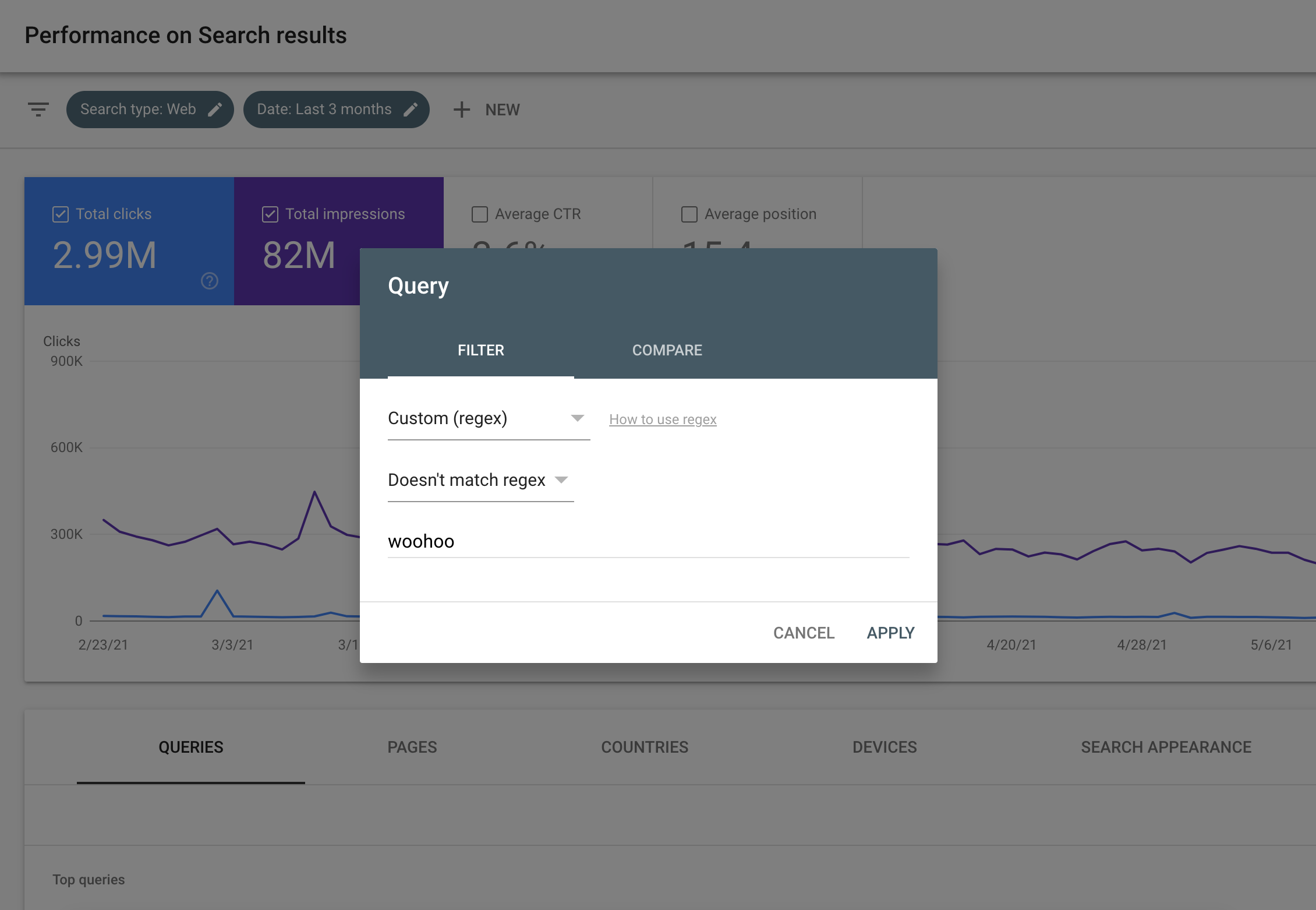วันพุธที่ 2 มิถุนายน 2021
เมื่อเร็วๆ นี้ เราได้แจ้งให้ทราบเรื่องการกรองข้อมูลที่ปรับปรุงดียิ่งขึ้นสําหรับรายงานประสิทธิภาพของ Search Console และเราดีใจที่ได้เห็นการตอบรับของชุมชนเกี่ยวกับประกาศนี้
เราให้ความสนใจในความคิดเห็นที่ได้รับเหมือนทุกครั้ง รวมถึงมีคําขอจำนวนมากที่ช่วยเติมเต็มชิ้นส่วนภาพที่ขาดหายไป นั่นคือการเพิ่มตัวเลือกการทำงานแบบเชิงลบลงในตัวกรองนิพจน์ทั่วไป
ข่าวดีก็คือ เริ่มตั้งแต่วันนี้ตัวกรองรายงานประสิทธิภาพจะรองรับตัวกรองนิพจน์ทั่วไปทั้งที่ตรงกันและไม่ตรงกัน ตัวเลือกนี้มีให้ใช้งานผ่านเมนูแบบเลื่อนลงชั้นที่สอง ซึ่งจะปรากฏหลังจากเลือก "กําหนดเอง (นิพจน์ทั่วไป)" ในตัวเลือกตัวกรอง ดังที่แสดงในภาพหน้าจอด้านล่าง ดูข้อมูลเพิ่มเติมเกี่ยวกับการกรองข้อมูลประสิทธิภาพการค้นหา

เคล็ดลับง่ายๆ สำหรับการใช้นิพจน์ทั่วไปใน Search Console
เรายังคิดด้วยว่าหากคุณเพิ่งเริ่มใช้นิพจน์ทั่วไป การให้คำแนะนำการใช้งานสั้นๆ จะเป็นประโยชน์สำหรับคุณ
อย่างแรกเลย มาทำความเข้าใจกันก่อนว่านิพจน์ทั่วไปคืออะไร หากอธิบายโดยย่อ นิพจน์ทั่วไปก็คือลําดับของอักขระที่ระบุรูปแบบการค้นหา ซึ่งให้คุณใช้สร้างตัวกรองขั้นสูงเพื่อรวมหรือยกเว้นคำหรือวลีมากกว่า 1 รายการ เมื่อใช้นิพจน์ทั่วไป คุณสามารถใช้อักขระเมตาได้จํานวนหนึ่ง ซึ่งเป็นอักขระที่มีความหมายพิเศษ เช่น ใช้กําหนดเกณฑ์การค้นหา โปรดดูข้อมูลอ้างอิงไวยากรณ์นิพจน์ทั่วไป RE2 สําหรับการอ้างอิงอักขระเมตาทั้งหมดที่ Search Console รองรับ
หากคุณสงสัยว่าเมื่อใดควรใช้นิพจน์ทั่วไปแทนที่จะใช้ตัวกรองประเภทอื่น ให้ลองดูตัวอย่างการใช้นิพจน์ทั่วไปแทนตัวกรองประเภทอื่นต่อไปนี้
- จัดกลุ่มผู้ใช้ที่รู้จักแบรนด์ของคุณอยู่แล้ว - ใช้นิพจน์ทั่วไปที่ระบุชื่อบริษัทของคุณได้หลายรูปแบบ รวมถึงการสะกดผิด วิธีนี้จะบอกให้คุณรู้ได้ว่าผู้ใช้แต่ละกลุ่มใช้การค้นหาประเภทใด และส่วนใดของเว็บไซต์ที่ดึงดูดผู้ชมแต่ละคน
เช่น หากชื่อบริษัทของคุณคือ
Willow Treeคุณอาจต้องสร้างตัวกรองสําหรับรูปแบบต่างๆ ทั้งหมด เช่นwillow tree|wilow tree|willowtree|willowtee(อักขระเมตา|หมายถึงคําสั่ง OR) - วิเคราะห์การเข้าชมส่วนของเว็บไซต์ - ใช้นิพจน์ทั่วไปที่เน้นไดเรกทอรีที่เจาะจงในเว็บไซต์ ซึ่งจะช่วยให้คุณรู้ว่าคำค้นหาใดที่มีการใช้บ่อยสำหรับเนื้อหาในแต่ละส่วน ตัวอย่างเช่น หากโครงสร้าง URL ของคุณคือ
example.com/[product]/[brand]/[size]/[color]และต้องการดูการเข้าชมที่นำไปยังรองเท้าสีเขียว แต่ไม่สนใจว่าจะเป็นยี่ห้อหรือขนาดใด คุณอาจใช้shoes/.*/green(.*จะตรงกับอักขระใดก็ได้และกี่ครั้งก็ได้) - ทำความเข้าใจเจตนาของผู้ใช้ - ใช้นิพจน์ทั่วไปเพื่อวิเคราะห์ว่าคำค้นหาแบบใดที่นำผู้ใช้ไปยังส่วนต่างๆ ของเว็บไซต์
ตัวอย่างเช่น คุณอาจสนใจการค้นหาที่มีคำที่เป็นคำถาม ตัวกรองคำค้นหา
what|how|when|whyอาจแสดงผลการค้นหาที่บ่งชี้ว่าเนื้อหานั้นควรจะตอบคำถามได้โดยง่าย โดยอาจใช้การตอบผ่านคำถามที่พบบ่อยก็ได้ อีกตัวอย่างหนึ่งอาจเป็นคําค้นหาที่มี (หรือไม่มี) คําที่เกี่ยวกับการทำธุรกรรม เช่นbuy|purchase|orderนอกจากนี้ นิพจน์เหล่านี้ยังใช้แสดงชื่อผลิตภัณฑ์ที่ใช้กันทั่วไปหรือที่ไม่ค่อยใช้กันได้ด้วย
โปรดไปที่ศูนย์ช่วยเหลือของ Search Console เพื่อดูนิพจน์ทั่วไปที่พบบ่อย และหากคุณมีตัวอย่างดีๆ ของวิธีใช้นิพจน์ทั่วไป ก็แชร์บน Twitter โดยใช้แฮชแท็ก #performanceregex ได้เลย
หากมีข้อสงสัยหรือข้อกังวลใดๆ โปรดติดต่อเราในชุมชน Google Search Central หรือทาง Twitter
